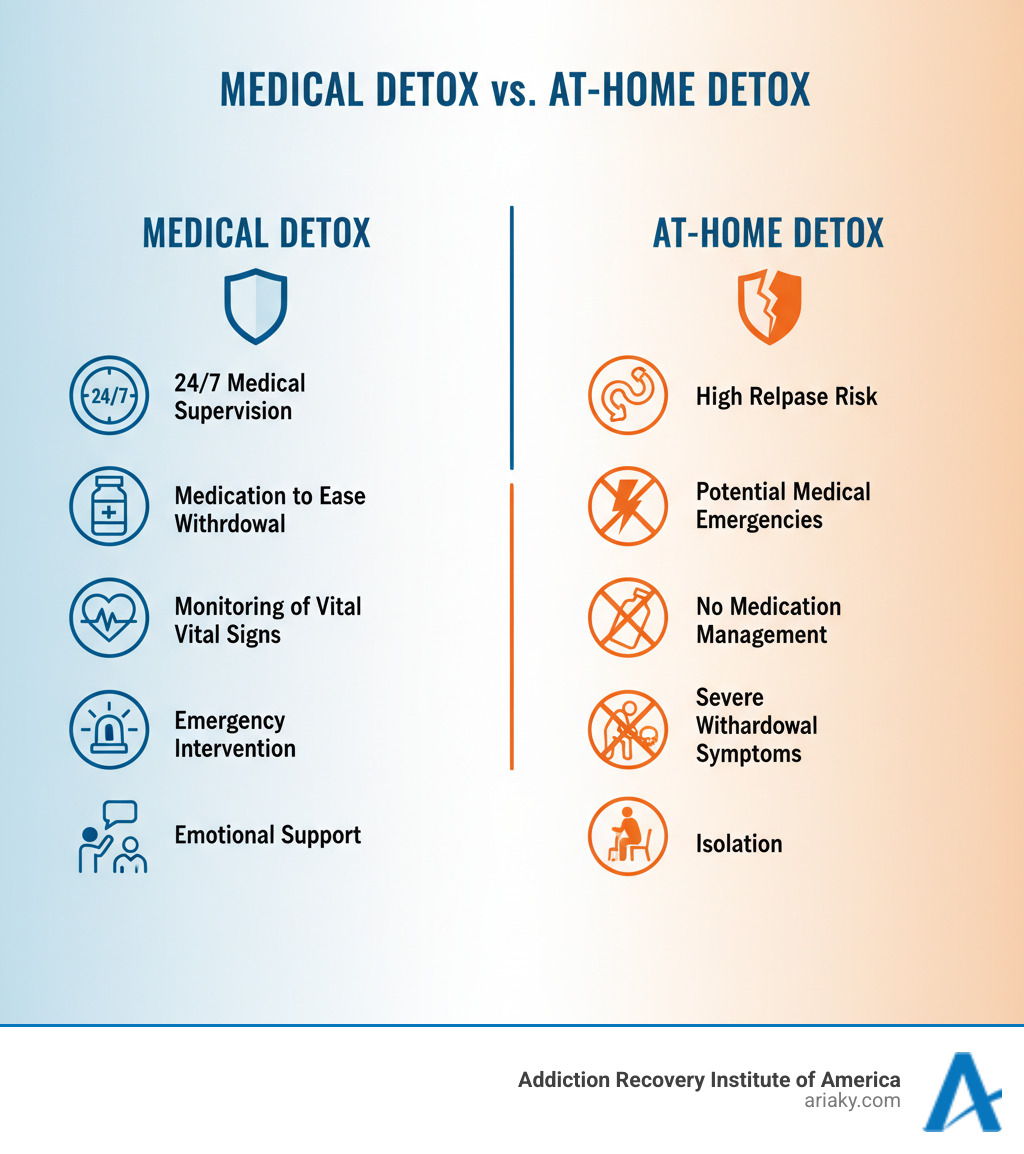Why Medical Detox is Critical for Safe Recovery
Medical detox is the process of safely removing toxic substances from your body under professional medical supervision. For many, the fear of withdrawal prevents them from seeking help, which is why medical detox is so essential.
Quick Answer: What is Medical Detox?
- Definition: Medically supervised withdrawal management that clears drugs or alcohol from your body.
- Duration: Typically 5-7 days, but can range from 3 days to several weeks depending on the substance.
- Purpose: Manages dangerous withdrawal symptoms and prepares you for ongoing addiction treatment.
- Setting: A hospital, specialized detox facility, or addiction treatment center with 24/7 medical care.
- Key Difference: Unlike at-home detox, it provides medications, monitoring, and emergency intervention to prevent life-threatening complications.
Medical detoxification is the first step in addiction recovery. While not a cure for addiction, it provides a crucial foundation. Think of it as stabilizing an acute crisis so that long-term healing can begin.
The truth is simple: stopping cold turkey can be difficult and, in some cases, life-threatening. Withdrawal from substances like alcohol and benzodiazepines can cause seizures, hallucinations, and dangerously high blood pressure. Medical detox ensures trained professionals can manage these symptoms before they become life-threatening.
Completing medical detox increases the likelihood of long-term sobriety. It provides a safe, controlled environment free from triggers, with expert guidance to ensure your safety and comfort.

Understanding Medical Detox: The Safe First Step to Recovery

Addiction is a complex disease that creates physical dependence, requiring a safe, controlled environment to address. Just as a condition like diabetes sometimes requires immediate medical attention, addiction withdrawal needs professional management. That’s what medical detox provides—it manages the acute physical symptoms your body experiences when you stop using substances.
Your brain adapts to the presence of drugs or alcohol, and when they’re suddenly removed, it needs help readjusting. This is a biological process, not a moral failing. You can learn more about how drugs change your brain’s chemistry.
What is Medical Detoxification?
Medical detoxification involves a licensed medical team—doctors, nurses, and clinical staff—supervising the process of safely removing addictive substances from your body around the clock. The goals are to:
- Safely manage withdrawal symptoms, preventing dangerous or life-threatening reactions.
- Clear your body of the substance, allowing it to restore its natural balance.
- Prepare you for ongoing treatment, stabilizing you so you can engage in therapy and counseling.
This differs from non-medical or “social detox” approaches, which lack the medical oversight needed to manage potentially dangerous complications.
The Dangers of Detoxing at Home
While the privacy of home is appealing, detoxing without medical supervision is dangerous if you have a significant physical dependence. Key risks include:
- Severe Withdrawal Complications: Abruptly stopping alcohol or benzodiazepines can cause seizures, delirium tremens (DTs), or extreme hallucinations, which can be fatal.
- Medical Emergencies: Unsupervised withdrawal can trigger heart attacks, strokes, or respiratory failure. In a medical facility, help is seconds away.
- High Relapse Risk: Unbearable withdrawal symptoms often lead to relapse. This is especially dangerous because your tolerance has likely decreased, increasing the risk of a fatal overdose.
- Emotional Toll: Detoxing alone can amplify anxiety, depression, and isolation, making the process psychologically overwhelming.
Key Benefits of Professional Supervision
Choosing a professional medical detox program at ARIA Kentucky means choosing safety, comfort, and a greater chance of long-term success.
- 24/7 Medical Safety: Our team continuously monitors your vital signs and can intervene immediately if complications arise, drastically reducing the risk of life-threatening events.
- Increased Comfort: We use medications to significantly reduce the severity of withdrawal symptoms, making the process more tolerable so you can focus on getting better.
- Emotional and Psychological Support: Our compassionate staff understands what you’re going through and provides support to help you manage the anxiety and depression that often accompany withdrawal.
- A Foundation for Recovery: By safely managing withdrawal, medical detox clears the way for comprehensive treatment. You’ll enter therapy with a clear mind and a body that’s ready to heal.
Who Needs Medical Detox and What to Expect

Deciding if medical detox is right for you depends on the substance used, the degree of physical dependence, and the risks of withdrawal. A professional evaluation is the safest way to determine the appropriate level of care.
Signs You Need Professional Help
Professional medical detox is necessary if you experience:
- Physical Dependence: Signs like tremors, sweating, nausea, or seizures when you try to stop or cut back.
- Failed Quit Attempts: Repeatedly trying to quit on your own but relapsing due to severe withdrawal symptoms.
- Using to Avoid Withdrawal: Needing the substance not to get high, but simply to feel normal and prevent withdrawal sickness.
- Co-occurring Disorders: Managing mental health conditions like anxiety or depression, which can complicate withdrawal.
- High-Risk Use: A history of using large amounts, for long periods, or mixing multiple substances.
Substances That Require Medical Detox
Withdrawal from certain substances can be particularly dangerous without medical supervision.
- Alcohol: Withdrawal can cause high blood pressure, seizures, and delirium tremens (DTs), which can be fatal. Learn more about our Alcohol Detox Programs in Kentucky. For more details, see this resource on alcohol withdrawal.
- Benzodiazepines: Drugs like Xanax and Valium can cause severe anxiety, agitation, and seizures if stopped abruptly. Our Benzo Detox Program in Kentucky provides safe, monitored tapering. More on benzodiazepine withdrawal here.
- Opioids: While rarely fatal, withdrawal from heroin, fentanyl, or painkillers is uncomfortable, with severe flu-like symptoms that often lead to relapse. We offer specialized Heroin Detox, Opioid Detox, and Opiate Detox Programs in Kentucky.
- Stimulants: Cocaine and meth withdrawal can cause severe depression, exhaustion, and intense cravings. Our Meth Detox Program in Kentucky provides support for these challenges.
- Other Prescription and Synthetic Drugs: Drugs like sleeping pills, muscle relaxants, or synthetic compounds can also cause unpredictable withdrawal symptoms requiring medical management. See our Prescription Drug Detox Program in Kentucky.
The Process: From Evaluation to Stabilization
Your journey at ARIA Kentucky begins with a supportive, step-by-step process:
- Initial Assessment: Our medical team conducts a comprehensive evaluation of your medical history and substance use patterns to understand your unique needs. This follows best practices, like those outlined by the Detoxification of Chemically Dependent Inmates guidelines.
- Personalized Detox Plan: Based on your assessment, we create a custom plan outlining medications, monitoring frequency, and supportive therapies.
- Stabilization: Under 24/7 medical supervision, our team monitors your vital signs and administers medications to ease discomfort and prevent complications. This occurs in a calm, nurturing environment focused on your well-being.
How Long Does Medical Detox Last?
The duration of medical detox varies, typically lasting five to seven days. However, the timeline depends on several factors:
- Type of substance
- Severity and duration of use
- Individual factors like metabolism, overall health, and co-occurring conditions
- Use of multiple substances (polysubstance use)
Research on topics like outpatient buprenorphine outcomes confirms the need for individualized care. We prioritize your safety and comfort, and you will remain in our care for as long as is medically necessary to achieve stabilization.
The Medical Detox Process: Managing Withdrawal and Providing Support
At ARIA Kentucky, our approach to medical detox involves expert medical care and compassionate support to manage both the physical and emotional aspects of withdrawal.
Common Withdrawal Symptoms and Your Medical Detox Plan
Withdrawal symptoms vary but generally include a combination of physical, psychological, and emotional challenges.
- Physical Symptoms: Nausea, vomiting, muscle aches, sweating, tremors, and fatigue are common. In severe cases, withdrawal from alcohol or benzodiazepines can cause seizures and dangerously high blood pressure.
- Psychological Symptoms: Intense anxiety, irritability, mood swings, depression, and restlessness are frequent. Some may experience hallucinations or paranoia.
- Cravings: Overwhelming urges to use again can make it difficult to focus on anything else.
Your personalized medical detox plan at ARIA Kentucky is designed to address these challenges with 24/7 monitoring, a comfortable environment, and nutritional and hydration support to help your body heal. For more on what to expect, see our resources on the Alcohol Withdrawal Timeline, What Happens After Quitting Alcohol?, and Alcohol WD.
Medications Used in Medical Detox
Medication-Assisted Treatment (MAT) is a cornerstone of safe medical detox. These evidence-based medications alleviate withdrawal, reduce cravings, and prevent life-threatening complications. A review of pharmacological strategies for detoxification highlights their importance.
For opioid withdrawal, we use medications like Methadone or Buprenorphine (Suboxone, Sublocade) to prevent withdrawal symptoms and cravings. Other medications like lofexidine or clonidine can manage physical discomfort.
For alcohol withdrawal, benzodiazepines (e.g., diazepam) are the standard for preventing seizures and delirium tremens. Anticonvulsants like gabapentin may also be used.
For benzodiazepine withdrawal, a slow, medically supervised taper using a long-acting benzodiazepine is the safest approach to prevent severe withdrawal.
Other helpful medications include naltrexone (Vivitrol) to reduce cravings for alcohol and opioids, as well as symptom-specific drugs for nausea or insomnia.
| Substance Category | Common Medications | Purpose |
|---|---|---|
| Opioids | Methadone, Buprenorphine (Suboxone, Sublocade), Lofexidine, Clonidine | Prevent withdrawal symptoms, reduce cravings, manage autonomic symptoms |
| Alcohol | Benzodiazepines (Chlordiazepoxide, Diazepam), Gabapentin, Carbamazepine, Acamprosate | Prevent seizures and DTs, reduce withdrawal severity, support abstinence |
| Benzodiazepines | Diazepam (gradual taper), Pregabalin, Carbamazepine | Safely reduce dependence, prevent severe withdrawal |
The Importance of Psychosocial Support
Managing the physical side of withdrawal is only half the battle. Psychosocial support is vital for addressing the emotional and psychological challenges.
- Individual Therapy: Provides a private space to process emotions and begin understanding the root causes of your substance use.
- Group Counseling: Connects you with peers who understand your experience, fostering a sense of community and reducing feelings of isolation.
- Coping Skills: Our staff helps you develop early coping mechanisms for managing stress and cravings.
This support builds a therapeutic alliance and prepares you for the next phase of treatment, where the deeper work of recovery begins.
Beyond Detox: Building a Foundation for Lasting Sobriety

Completing medical detox is a monumental achievement, but it’s the beginning of your recovery journey, not the end. Detox is the first chapter in a longer, more meaningful story.
Why Medical Detox is Only the First Step
Think of addiction as a tree. Medical detox clears away the visible branches, but the roots—the psychological, emotional, and behavioral patterns that fuel addiction—remain. Detox addresses physical dependence, but treatment is needed to address the psychological dependence: the cravings, triggers, and underlying issues like trauma or co-occurring mental health conditions.
Without continued care, relapse rates are high. Studies show that individuals who transition from medical detox into a comprehensive treatment program have a much greater chance of achieving long-term sobriety. You can read more about common Addiction Recovery Challenges.
In short, detox stabilizes your body. Treatment teaches you how to build a new life.
Transitioning to Long-Term Addiction Treatment
At ARIA Kentucky, we provide a seamless continuum of care, guiding you from one level of support to the next. After medical detox, most individuals transition into a structured treatment program to build on their newfound stability.
- Residential Programs: Live-in programs (30-90 days) provide an immersive, trigger-free environment to focus entirely on recovery through individual and group therapy.
- Partial Hospitalization Program (PHP): A step-down option offering intensive clinical care during the day while you live at home or in a sober living environment.
- Intensive Outpatient Program (IOP): A flexible option with several therapy sessions per week, allowing you to integrate recovery skills into your daily life while working or attending school.
Before you leave, we create a comprehensive aftercare plan that serves as your roadmap for ongoing recovery, including support groups and continued therapy. We explore these options in our guide to the Continuum of Care and explain the differences in our Inpatient vs Outpatient resource.
Recovery is a journey, not a destination. At ARIA Kentucky, we’re committed to walking alongside you every step of the way.
Frequently Asked Questions about Medical Detox
Taking the first step toward recovery brings up many questions. Here are answers to some common concerns about medical detox.
Is medical detox the same as rehab?
No, they are two distinct but connected stages of recovery. Medical detox focuses on the physical aspect: safely managing withdrawal symptoms to stabilize your body. Rehab (rehabilitation) addresses the psychological aspect: using therapy to uncover the root causes of addiction, develop coping skills, and build a foundation for long-term sobriety. Detox is the essential first step that makes the deeper work of rehab possible.
How much does medical detox cost?
The cost of medical detox varies based on the substance, length of stay, and level of medical care required. The good news is that most insurance plans cover addiction treatment services. Our admissions team at ARIA Kentucky can verify your insurance benefits and explain any out-of-pocket costs. We are committed to making treatment accessible. For more information, visit our Paying for Treatment page.
Can I be forced into medical detox?
In most cases, an adult cannot be forced into medical detox against their will. However, there are legal exceptions. If an individual is a danger to themselves or others, emergency intervention may be possible. Some states, including Kentucky, have involuntary commitment laws (like a “Marchman Act”) that allow a court to order treatment if a person’s addiction has rendered them unable to make rational decisions about their own safety.
If you are concerned about a loved one who refuses help, our team can provide guidance on available resources and how to approach the situation with compassion.
Take the First Step Towards a New Life
Choosing to start medical detox is a courageous decision. It’s the first step toward reclaiming your life from addiction, and you don’t have to do it alone.
Medical detox provides the safety, comfort, and support needed to get through withdrawal and build a foundation for lasting recovery. It’s where the fog begins to clear and hope becomes real again.
At Addiction Recovery Institute of America (ARIA Kentucky), we offer accredited, AODE-certified programs custom to your unique needs. From detox to our residential, PHP, and IOP programs, we are here to guide you through each stage of recovery.
With locations across Kentucky—including Ashland, Bowling Green, Covington, Florence, Lexington, Louisville, Morehead, Newport, Owensboro, and Paducah—expert care is always within reach. Our compassionate team understands what you’re going through and is ready to help.
There is never a “perfect” time to start, but there is this time. You deserve a life free from addiction, full of purpose and hope. That life is possible, and it starts with one phone call.
Contact Addiction Recovery Institute of America today to speak confidentially with our admissions team. There’s no pressure or judgment—just a sincere desire to help you find your path forward.

